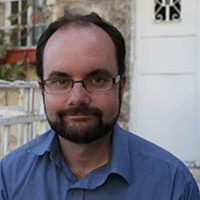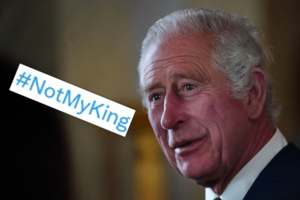Symon Hill
( political activist, writer) | |
|---|---|
 | |
| Alma mater | Westminster College (Oxford) |
Symon Hill is a political activist and writer who has worked as campaigns manager at the Peace Pledge Union since 2016 and also teaches history for the Workers' Educational Association.[1]
On 11 September 2022, Symon Hill was arrested at a proclamation ceremony in Oxford for voicing an anti-monarchy opinion.[2]
Who elected him?

Symon Hill explained the background to his arrest:
I had not planned to protest today. To be honest, I’m tired and lacking in energy after not being well lately. And I am not some sort of heroic campaigner who rushes round resisting without rest. I am a lot less energetic and dedicated than some people seem to imagine!
I knew that Charles Windsor would be declared “King Charles III” in official ceremonies around the UK today. I had assumed they would be fairly small-scale. Yesterday, a good friend discouraged me from protesting because she was concerned about my health. I reluctantly agreed that she had a point.
It was only when I went to church this morning that I learnt that there was not only a proclamation in Oxford but a procession that would start just outside our church. I was feeling sad and angry as I left church and walked past the cordoned off streets and saw the dignitaries and military leaders standing on the steps of Carfax Tower in clothing more suited to the sixteenth century. This, apparently, is how we proclaim a new head of state in twenty-first century Britain.
After making slow progress along the pavement, I asked the police how I could get across to the other side as the road was closed off. When I expressed a mild criticism of the royal procession during my question about the road closures, they became defensive and refused to talk with me further. Someone who had heard me came over and challenged my views, but the police told us not to talk to each other. I have no idea on what basis the police stop people with different views having a discussion.
I paused briefly to look at a couple of things on my phone, before realising they were about to read out the proclamation. I had previously doubted whether I wanted to stay and hear it, but I was there now. I remained quiet in the first part of the proclamation, concerning the death of Elizabeth II. Any death is sad and I would not object to people mourning.
It was only when they declared Charles to be “King Charles III” that I called out “Who elected him?” I doubt most of the people in the crowd even heard me. Two or three people near me told me to shut up. I didn’t insult them or attack them personally, but responded by saying that a head of state was being imposed on us without our consent.
A security guard appeared, stood right in front of me and told me to be quiet. Two more security guards came along and they tried to push me backwards. As I asked them to give the legal basis for what they were doing, the police came over, more or less moved the security guards out of the way and took hold of me. I was outraged that they were leading me away, but was taken aback when they told me they were arresting me. I have no illusions about the police’s questionable relationship with the law, but I seemed to have been arrested for nothing more than expressing an opinion in public. They gave me confused answers when I asked on what grounds I had been arrested.
As the police led me away, I heard people asking them why I was being arrested. Eventually I realised that two men were walking along beside them demanding answers about it. I heard one of them say, “I don’t agree with him but surely he’s got a right to his views? Isn’t this a free country?” (or similar words). These two people – not activists, not anti-monarchy – were giving a fine example of excellent citizenship by speaking up when they saw the police abusing their powers. I have no idea who they were, but their actions really cheered me.
Eventually I was handcuffed – I don’t know what sort of threat they thought I posed – and put in the back of a police van. A police officer got in the van and took my details. After lots of conversations on his radio he said I would be de-arrested but that they would want to interview me. I said I would do so only with a lawyer present. After some more radio conversations he told me I would be de-arrested and then contacted to be interviewed at a later date, and possibly charged.
I was then driven home in the police van. At this point, I had still not been given a clear answer as to why I had been arrested.
At first I was told that the sergeant who had arrested me would know the reason. This was an appalling answer. Eventually, on the way home, I was told that I had been arrested under the Police, Crime, Sentencing & Courts Act 2022 (the outrageous act passed earlier this year) for actions likely to lead to “harassment or distress”.
I would be surprised if anyone among the few people who had heard me felt harassed or distressed by encountering an opinion that they may have disagreed with.
It took me a while – and a cup of tea, and conversations with people I live with – before I posted on Twitter about what had happened. Most responses were sympathetic and outraged. Some of the more hostile ones accused me of doing all this for the sake of self-promotion. This is impossible: the actions I had taken were unlikely to lead to my arrest and I was very surprised to be arrested.
While I am determined to speak out about this unjust arrest, and about the unfairness of monarchy, I would much rather be doing other things today. I would rather not have spent much of the afternoon trying to calm down and stop shaking as I answered media calls, supportive messages and abusive tweets. I would rather not spend tomorrow morning phoning a lawyer. I would much rather get on with all the things I needed to do anyway. This did not happen because of some cunning plan on my part, but because the police abused their powers to arrest someone who voiced some mild opposition to a head of state being appointed undemocratically.
What other freedoms can be suppressed in the name of monarchy? Who else will be arrested under the vile Police, Crime, Sentencing and Courts Act? I am relatively lucky: I will not be sacked from my job as a result of being arrested, or experience some of the consequences that others may face. If fear of arrest deters people from expressing their views, then these vile laws and draconian atmosphere will have significantly reduced free expression and harmed democracy, whether or not people are charged.
This isn’t about me. It’s about our freedom to choose our own system of government, to elect our own leaders and to express our own views. I’m not asking you to support me. I’m asking you to support democracy.[3]
Activism
Symon Hill was one of a group of Christian pacifists, supported by the former Archbishop of Canterbury Rowan Williams, who were arrested at the DSEI arms fair in London in 2013.
He was one of the organisers of the Christian "Ring of Prayer" at the eviction of Occupy London Stock Exchange in 2012.
He was associate director of the left-wing Christian think tank Ekklesia until 2013 and continues as an Ekklesia associate.
In the summer of 2011 Symon Hill went on a pilgrimage of repentance for homophobia, walking from Birmingham to London, attracting widespread media attention. Hill read theology at Westminster College, Oxford.
Symon Hill was formerly media spokesperson for the Campaign Against Arms Trade (CAAT).[4] He represented CAAT in the media when they took the British Government to court in 2007–08 over the cancellation of a Serious Fraud Office investigation into BAE Systems arms deals with Saudi Arabia. As a result, comedian Mark Thomas nominated him as a Hero of 2007 in The Independent on Sunday.
Hill writes mainly on the issues of disarmament, public activism, sexuality, and the role of religion in society. His comment pieces have appeared in newspapers as diverse as the Sunday Herald, the Morning Star and the Daily Mail. He contributes regularly to Guardian Comment is Free, The Friend and Movement.
Books
Symon Hill's most recent book is "The Upside-down Bible: What Jesus really said about money, sex and violence", published in 2015.
He has written two other books: "The No-Nonsense Guide to Religion" was published by New Internationalist magazine in March 2010 as part of its No-Nonsense Guides series. And a book about on-line activism called "Digital Revolutions: Activism in the age of the internet" published by New Internationalist in April 2013.
Related Document
| Title | Type | Publication date | Author(s) | Description |
|---|---|---|---|---|
| Document:Solidarity with all protesting the imposition of an unelected King | Op-ed | 12 September 2022 | Radical Independence Campaign | The death of Elizabeth II means the automatic appointment, with no discussion or reflection on our future, of a King manifestly unfit to represent the modern peoples of these islands. Charles is unelected, and unelectable. He would never have been chosen in a democratic system. |
References
Wikipedia is not affiliated with Wikispooks. Original page source here